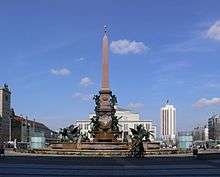Fountains in Leipzig
The fountains in Leipzig were originally built as part of the city's water supply and in the 19th and 20th centuries others were added for decorative functions. They are regarded as objects of historical and art historical interest.
| Wikimedia Commons has media related to Fountains in Leipzig. |
Water supply
Decorative
"Badender Knabe" and "Badendes Mädchen"
Löwenbrunnen
It is located on the Naschmarkt opposite the main entrance of the Madler Passage and was built in 1918, on the location of buildings dating from. 1690 It fountain is reached by three steps that surround it and is decorated with mythical creatures and marine sandstone reliefs. On the copper painted hood, there was a pyramid, crowned at the tip with a golden sun.
Around 1820 there was a decorated pump handle in the form of an iron lion and designed by the Berlin sculptor Johann Gottfried Schadow and cast by Lauchhammert. It was incorporated into the lion fountain designed by the Leipzig Oberbaurat Hugo Licht. There is a Versalinschrift on the back of the fountain which reads "In the last war in 1918, this fountain in the shape of the old wooden housing has been rebuilt from the rate by the architect Dr. Ing. Hugo Lucht. The funds were donated by the Hugo Haschke Company."
Mägdebrunnen
Märchenbrunnen
Mendebrunnen

The Mende Fountain is located at Augustusplatz in front of the Gewandhaus (Concert Hall). It is the largest fountain in Leipzig and cost 189,000 gold marks to construct. It was built by Adolf Gnauth in 1883–86. Pauline Mende, a merchant's widow, bequeathed her money to Leipzig for building a fountain. In honor to her Leipzig give the fountain her name.
Rathausbrunnen
Villersbrunnen
(Incorporates information translated from the German Wikipedia)